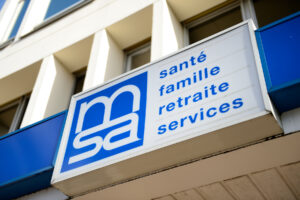Ground News
Get every side of the story with Ground News, the biggest source for breaking news around the world. This news aggregator lets you compare reporting on the same stories. Use data-driven media bias ratings to uncover political leanings and get the full picture. Stay informed on stories that matter with Ground News.
General safety in France
Common-sense security precautions will help to avoid a lot of problems while in France, particularly being aware of one’s surroundings and avoiding high-risk areas.
Out and about
When going out, carry only essential items: one credit/ATM card, one piece of identification, and no more than €40–50. Avoid carrying high-value jewelry and large amounts of cash. Valuables should be kept out of sight and in places difficult for thieves to reach, such as internal coat pockets or in pouches hung around the neck or inside clothes. Shoulder bags and wallets in back pockets are an invitation to a thief.
Keep photocopies of travel documents and credit cards separate from the originals, along with key telephone numbers to contact banks for credit card replacement.
Crowded elevators and escalators and crowded metro cars should raise awareness levels. When possible, take a seat or stand against a wall to deter pickpockets and try to maintain a 360-degree awareness of the surrounding area.
Carry only a purse that zips closed and ensure that it is carried under the arm and slightly in front of the body. For a backpack-type purse, swing it around so that it is slightly in front of the body. Wallets that are carried on the body should be in a front pocket. While on foot, remain aware of your surroundings at all times and keep bags slung across the body, with the bag hanging away from the street.
One of the most common methods of stealing purses or bags is from the back of a chair or from under the table while in cafes, restaurants, and nightclubs/bars, including higher-end establishments. Again, keep your valuables with you and never leave them unattended or out of your sight.
Some swindlers may impersonate police officers and ask for your identification and money. First of all, bear in mind that a real police officer will never ask for money.
Ask for their white plastic three-color card indicating “Police” in the center, diagonally crossed in blue, white and red and bearing markings on both sides.
Be aware that thieves often operate in groups and will come to each other’s aid if confronted. If a thief is caught in the act, a simple pickpocketing could turn into an assault (or worse) if an attempt is made to capture the thief. You can shout out for police assistance to attract attention, but do not pursue whomever you think stole your wallet or bag.
Public parks should be avoided after dark as they are often frequented by drug dealers and prostitutes.
Many theft and assault victims are targeted when making their way home from a late night out after drinking alcohol. If you go out late at night, do so with a group of friends. There is safety in numbers.
ATMs
Do not use ATMs in isolated, poorly lit areas or where loiterers are present. Be especially aware of persons standing close enough to see the Personal Identification Number (PIN) being entered into the machine. Thieves often conduct successful scams by simply watching the PIN as it is entered and then stealing the card from the user in some other location. If the card gets stuck in the machine, you should immediately report it to the bank where the machine is located as well as to your own bank.
Transport
Unscrupulous individuals sometimes try to avoid paying fares by following closely behind those with valid tickets. Do not let any individual go through the turnstile directly behind you.
Never buy tickets from scalpers who will charge you extra (up to ten times their value). Instead, use ticket counters or ticket-issuing machines in stations.
Luggage can be a top target of thieves, so do not leave yours unattended.
Vehicle theft
Protect yourself against vehicle theft by:
- Locking the doors, trunk, and make sure the windows of your vehicle are completely closed;
- Not leaving valuable items in view (mobile phones, cameras, clothing items, bags, etc.).
Taxis
Never accept rides from someone who may offer their transport services in airports or in the street. This could be a bogus taxi – a crime punishable by the French Labour Code.
Authorized taxis in Paris have the following equipment:
- An illuminated ‘Taxi Parisien’ sign on the roof
- A display meter showing the cost of the trip
- A display at the rear of the vehicle and visible from the exterior, which enables the monitoring of the daily duration of use of the vehicle
- A plate fixed to the front fender bearing the license number
Over the past year, there has been an increase in reports by women of sexual harassment and assault by the driver. Women may want to consider having another individual walk with them to a taxi and, in plain view of the driver, note the license number of the vehicle, or call a friend while in the taxi and communicate the license number. Letting the driver know that others are aware of your trip and the license number of the taxi may reduce the chances of becoming a victim.
The Paris Police Prefecture publishes a pamphlet entitled “Paris in Complete Safety ” that provides practical advice and useful telephone numbers for visitors.
Main types of crime and levels by region
France is a relatively safe country. Most crimes are non-violent, but pick pocketing is a significant problem.
The majority of crimes directed against foreign visitors involve pick-pocketing, residential break-ins, bicycle theft, and other forms of theft with minimal violence. However, as in any big city, robberies involving physical assault do occur in Paris and other major urban areas. Visitors to congested areas and known tourist sites (e.g., museums, monuments, train stations, airports, and subways) should be particularly attentive to their surroundings. Crimes against visitors are generally crimes of opportunity, though these crimes are more likely to involve violence on the street late at night or when the victim detects the theft and resists the criminal. As in any major city, women should exercise extra caution when out alone at night and/or consider traveling out at night with companions. In general, Paris taxis are safe and professionally operated, but an increase in reported harassment and assaults on women by taxi drivers has been noted.
Caution is required throughout France when driving through economically depressed areas, where there is a high incidence of “smash and grab” robberies. Thieves will approach a vehicle that is stopped in traffic, smash a window, reach into the vehicle to grab a purse or other valuable item, and then flee. Therefore keep doors locked and valuables out of sight.
Throughout August, the month when most French residents take summer vacations, and in December, there is generally an increase in the number of residential break-ins. The majority are attributed to residents not using security measures already in place, including double locking doors and locking windows. Home invasions are often preceded by phone calls to see if the resident is at home. Often thieves who manage to gain access to the apartment building will knock on apartment doors to see if anyone answers, offering the excuse they are taking a survey or representing a utility company.
Crime in Paris
Crime in Paris is similar to that in most large cities. Violent crime is relatively uncommon in the city centre, but women should exercise extra caution when out alone at night and/or consider traveling out at night with companions. There has been an increase recently in reported sexual harassment, and sometimes assault, by taxi drivers.
Pickpockets are by far the most significant problem. In addition to purses and wallets, smart phones and small electronic devices are particular targets. In Paris, pickpockets can be any gender, race, or age and are commonly children under the age of 16 because they are difficult to prosecute. Pickpockets are very active on the rail link (RER B) from Charles de Gaulle Airport to the city centre. Travelers may want to consider using a shuttle service or one of the express buses to central Paris rather than the RER.
In addition, passengers on the Metro line 1, which traverses the city center from east to west and services many major tourist sites, are often targeted. A common method is for one thief to distract the tourist with questions or disturbances, while an accomplice picks pockets, a backpack, or a purse. Schemes in Paris include asking if you would sign a petition or take a survey and presenting a ring and asking if you dropped it. Thieves often time their pickpocket attempts to coincide with the closing of the automatic doors on the Metro, leaving the victim secured on the departing train. Many thefts also occur at the major department stores (e.g., Galeries Lafayette, Printemps, and Le Bon Marché), where tourists may leave wallets, passports, and credit cards on cashier counters during transactions.
Popular tourist sites are also popular with thieves, who favour congested areas to mask their activities. The crowded elevators at the Eiffel Tower, escalators at museums, and the area surrounding Sacré Coeur Basilica in Montmartre are all favoured by pickpockets and snatch-and-grab thieves. There have been some instances of tourists being robbed and assaulted near less utilised Metro stations. The area around the Moulin Rouge, known as Pigalle, requires extra vigilance to avoid becoming a victim. Pigalle is an adult entertainment area known for prostitution, sex shows, and illegal drugs. Unsuspecting tourists have run up exorbitant bar bills and been forced to pay before being permitted to leave. Other areas in Paris where extra security precautions are warranted after dark are Les Halles and the Bois de Boulogne.
Provence Alpes Maritimes (PACA) / Languedoc-Roussillon
The PACA/Languedoc-Roussillon region enjoys a fairly low rate of violent crime. The most common problems in the region are thefts from cars (both stopped in traffic and parked) and from luggage trolleys at the major transportation hubs (e.g., Nice Airport, and the railway stations at Marseille, Avignon, and Aix en Provence). US citizen victims reported to the U.S. Consulate General in Marseille fifty cases of theft from cars and twenty purse snatchings in transportation hubs during the May-June 2011 period. An increase in holiday rental-home burglaries and in necklace snatching has also been reported.
Keep your car doors locked and windows rolled up at all times. Valuables should be hidden out of sight to prevent snatch-and-grab attempts. Maintain visual contact with your car when visiting tourist sites, when using rest facilities at gas stations, or stopping to enjoy panoramic views, even for a short period, as thieves will break windows to access items left in cars. Victims are reporting car break-ins within minutes of leaving a car unattended. Passports should be kept separate from other valuables.
Strasbourg
Strasbourg’s historic center enjoys a fairly low rate of violent crime. Pickpockets and snatch-and-grab thieves tend to concentrate their efforts in the Petite France historic district popular with visitors.
Bordeaux
This large city is considered fairly safe – general crimes and offenses have been on the decline since 2005. As with any big city, you should be watchful of pickpockets and other tourist-aimed crimes in Bordeaux, especially around public transportation. However, local police are considered professional and responsive to persons who are victims of crime. Stolen purses, ID cards, and passports left in cars – particularly around renowned landmarks – routinely lead to requests for emergency issuance of passports.
Lyon
Although levels of violent crime are low, Lyon has a fair amount of petty crime and vandalism. Late-night weekend rowdiness is common in the center of town and in areas with nightclubs. But the public transportation system is safe at night and extensive police video surveillance on the streets is utilized. To combat reckless and drunk drivers and prevent them from fleeing accident scenes, Lyon has initiated 30 kph zones in commercial districts, and the local police have increased controls for drunken driving. They have also installed speed and red-light radar systems. Despite these efforts, in 2010 six pedestrians were killed by moving vehicles. The number of stolen passports and personal items in the district remains relatively low, and attacks are rare.
Home break-ins have increased recently; according to the local news, there are 30 per day, which represents a 16 percent increase over 2010. A recent wave of armed robberies in luxury goods stores and cash exchange businesses ended with the arrest of an organized gang of delinquents. Bicycle thefts are also a risk, as Lyon becomes increasingly bicycle-friendly and more people cycle around town.
Normandy
Break-ins and thefts from cars in the parking lots at the Normandy beaches and war cemeteries are common. Do not leave valuables unattended in a car. Locking valuables in the trunk is not an adequate safeguard as thieves often pry open car trunks to steal bags.
Rennes
In general, the city of Rennes is a relatively safe and secure environment, and crime rates tend to be lower than in larger cities elsewhere. There are occasional crimes in the center of Rennes related to drunkenness and rowdy behavior, with the largest and most boisterous crowds tending to gather on Thursday nights in the area around Rue Saint Michel (a.k.a., Rue de la Soif or Thirst Street) and the adjacent Place Sainte Anne. The local authorities, both police and political, make security a priority. The Rennes police are well informed about potential threats and respond quickly to any criminal issues occurring in the city. People do occasionally encounter theft of valuables and/or passports. Valuables left unattended in cars overnight, or for extended amounts of time, are particularly susceptible to theft. In particular, tourist sites around Brittany warn travelers against leaving expensive items in plain view in parked cars, due to frequent vehicle break-ins. Also, do not leave luggage unattended on trains.
Toulouse and the Midi-Pyrenees
Toulouse and the Midi-Pyrenees region are considered generally safe. Car theft, vehicle break-ins, petty theft, and burglary are the most common crimes, and they are relatively more frequent in areas near the railway station. Carjackings and home invasions may occur, particularly in wealthier areas surrounding Toulouse. Home invasions, although usually targeting valuables and cars, may include violence. Police are usually very helpful to travelers who are victims of crime. Itinerant street people, often in groups accompanied by dogs, are increasingly prevalent in downtown Toulouse, particularly in warmer weather. While alcohol and drug abuse can make them unpredictable, incidents of crime are relatively rare.
What to do if you’re a victim of crime
Paris community police has about a hundred public reception points scattered all over the capital. Among them, the 20 district (arrondissement) central police stations are open 24/7, in order to attend to victims and provide help and assistance.
Should you become a victim of an assault, try to make the attacker go away by making as much noise as possible (shouting / screaming). Take refuge in the nearest shop and get someone to call the police.
Try to give a description of your attacker (sex, approximate age, hair colour and cut, height and weight, distinctive features, such as beard, scars, tattoos, glasses, etc.). Let the police know how your attacker fled and in what direction. In the case of a vehicle, specify the colour, brand and, if possible, the license plate number (even if you have only seen part of this).
Well-known laws specific to France
French law distinguishes between “public law” and “private law.” Public law relates to government, the French Constitution, public administration, and criminal law. Private law covers issues between private citizens or corporations.
Secularism
The French Republic is founded on the separation of church and state and the principles of secularism are firmly established in the French constitution, known as laïcité. This is not anti-religion but rather confirms the public space as a secular one, while the practice of all religions is protected in the private sphere. The government takes very seriously the importance of providing for a secular society and has introduced several laws to uphold this.
In accordance with these principles the French government passed a law banning the wearing of the burka from April 2011. The clothing typically worn by Muslim women was seen as a religious expression in the public sphere and a symbol of divisiveness in French society. Previously, in 2004 France prohibited ostensible religious symbols from public schools. This was particularly directed at the wearing of veils and applied to all religions.
Crimes abroad
According to the French criminal code (code penal) every crime that is committed abroad by a French national is punishable in France. This has allowed the government to prosecute individuals for crimes committed by French citizens regardless of geography. This has included prosecuting individuals for genocide. The law also gives France jurisdiction in cases of genocide where the crime is committed by a non-French national against a French citizen. However, in these cases criminal proceedings can only be initiated by the public prosecutor following a complaint by the victim or their legal successors. Additionally, France’s criminal jurisdiction has international reach based on territorial impact, national security or protection of currency against counterfeiting.




